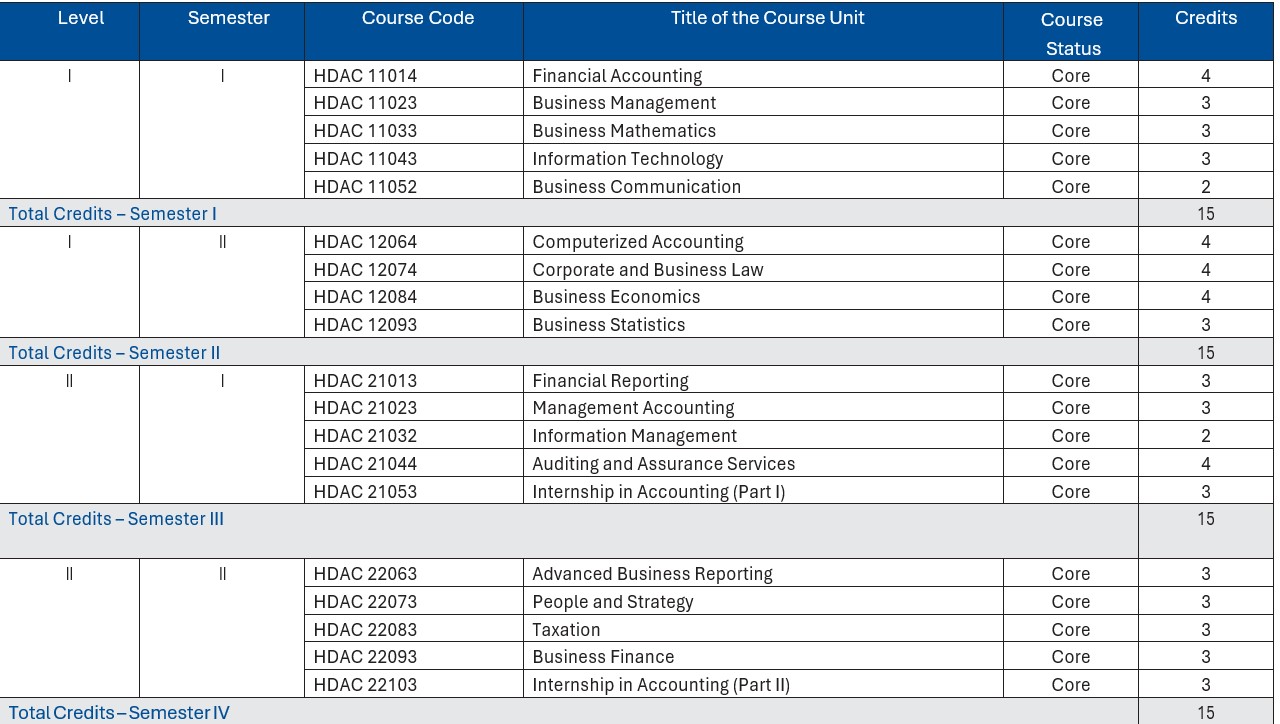Value of the Course
Today, accounting and finance is an integral part of every commercial establishment; be it retail, manufacturing, banking, insurance etc. Keeping in view of these facts and the stable nature of accounts and finance industry, a large number of students want to shape their future in this. However, these students lack the practical skills in accounting & finance because of which they face difficulties in getting employment. Accordingly this higher diploma programme will be the strongest foundation for the students who wish to continue their further education in accounting discipline.
This programme is designed for students, with modest or no previous knowledge in accounting and finance, who wish to study these subjects further, or who wish to undertake bachelors degree in accounting and finance but lack the depth of knowledge necessary to commence bachelors degree and master level study. This programme is two years program which provides an exit point after completing the first year course units. Accordingly, students who successfully complete the first year course units will be awarded with the Diploma in Business Accounting. Students who successfully complete the second year course units, student will be awarded with the Higher Diploma in Accounting. Accordingly, Higher Diploma in Accounting will provide a pathway to those who wish to pursue the bachelors degree.
This programme is identified as Sri Lanka Qualifications Framework Level (SLQL) 3 and 4 programmes according to the Sri Lanka Qualifications Framework. It qualifies a student to follow SLQL 5 programme which is indicated as a Bachelors degree of 90 credits. Accordingly, student who completes SLQL 4 need additional 30 credits more to obtain a bachelors degree in any recognized University.
Aims and Objectives
Aims
The program aims at providing students with basic knowledge in the areas of Accounting and Finance which incorporates both theoretical and practical aspects.
Thus the program will enable the students to;
- Enhance knowledge and competencies in Accounting.
- Establish a foundation to pursue further education in Accounting.
- Gain a competitive qualification to embark with numerous opportunities available in rapidly changing business environment especially in Accounting.
- Develop individual skills of the students to handle the issues pertaining to the Small and Medium Size Entrepreneurs in the field of Accounting.
- Provide opportunity for lifelong learning.
Objectives
- To introduce basic functions in accounting.
- To offer an understanding of the key managerial skills in the Accounting and Finance environment.
- To be able to analyze and interpret accounting information.
- To provide an understanding of contemporary developments in Accounting.
- To provide students to engage in practical exposure in accounting.
Structure And Design Of Curriculum
Higher Diploma in Business Accounting (HDip (BAcc)) structure consists of 4 semesters. Under the Qualifications and Credit Framework, HDip (BAcc) has two specific pathways as shown in the figure below. The first stage of the qualification can be considered as Diploma in Business Accounting (Dip (BAcc)) for which student must earn a minimum of 30 credits. However, a student can work straight through to earn the Higher Diploma in Business Accounting by acquiring a total minimum of 60 credits. A student can earn the qualification of Higher Diploma in Business Accounting (HDip (BAcc)) by successfully completing all course units under four semesters.
*After successful completion of the HDBA Programme of the University of Kelaniya, students will be eligible to progress into
- The Third Year of the Bachelor of Business Management (External) Degree, University of Kelaniya
- The Final Year of the BSc. (Hons) Accounting and Finance, Northumbria University, United Kingdom
- Bachelor of Business (Accountancy), Unitec Institute of Technology, New Zealand
- Bachelor of Science in Applied Accounting (General/Honours) Degree, SAB Campus of CA Sri Lanka
- The Third Year of the Bachelor’s Degrees offered by reputed Private Universities
Curriculum Structure Of The Higher Diploma In Business Accounting Programme

